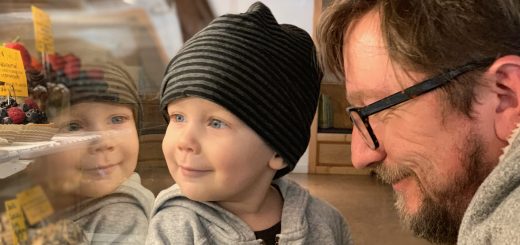Fatherhood and masculinity and therapy
As soon as I had my first panic attack a few weeks ago I began looking in earnest for a local therapist to talk to, something that’d been on my mind for months.
Since a crushing divorce before I met Stephanie I’ve found it easy to talk to therapists, something that was never the case before, and I owe the life that I have in many ways to having found ways to talk and work through difficult impulses and a lifetime of baggage without getting in my own way too much. Returning to this practice has already, even only three sessions in, brought me insight and clarity about my feelings about being a father in general, but especially about being a father and husband in a crisis.
As I’ve joined the world of parents of cancer kids, there’s a recurring observation that just can’t be shaken once recognized from hospital waiting rooms to patient playrooms, fundraising organizations to online support groups: that the vast majority of the emotional and practical effort expended in caring for sick kids falls on the mothers. Of course there are exceptions – please don’t “not all dad’s” me, this isn’t about you.
The truth is I’ve had doubts about myself all along – I never thought I’d even be a father, and then I quietly worried that I wouldn’t be a good father, not the kind I wanted rather than the one I had, and that he had, and on back through the generations of shattered men who never learned to care for their children. These men were broken by childhood, and nature offered them a long shot – to be reborn as a father, to find the joy they never had in nurturing and protecting their own children, but this was and is often too difficult compared to absenteeism. Even if they were present physically, their internal self, their emotional core, is off limits; but just as often, they just weren’t even there. Selfishly immersed in work, or skipping off to find another family, one that they might not have to work as hard at, is what so many men take as choices.
I wanted that long shot – to be present, nurturing, and protective, to deal with our challenges without any thought of retreating into myself, in many ways to react like a mother would. And, of course, I feared I wasn’t up to it. Maybe I could have bluffed my way through a healthy child’s upbringing, but Wes’ leukemia was going to break me, and when his body recovered and the cancer was long gone so might I be, along with the chance of having a childhood guided by the kind of father I wanted for him.
Around the the same time I was planning for a weeklong work trip to Europe that I hadn’t pushed back enough on, that wasn’t really critical, and it triggered feelings of failure as a father and husband. While earning a living is important, it’s relatively easy for me compared to what I wasn’t doing. So I melted down, afraid I was becoming what generations of broken men had passed down to me; what so many families in similar situations were finding out their men were. Detached. In denial. Unsupportive. Unable to be vulnerable, inverting strength and weakness. Gone at the first sign of trouble.
It’s not my first trip through therapy, but it’s amazing still to see the dots connected for me so readily. Feelings of abandonment as a child have been central in my life. I wanted nothing more, in past relationships as now, than to learn to be a part of a family, to care for and earn the trust of my own wife and children. And then I found myself in an extraordinary situation, highly stressed, where many men like me just bow out and… here I was leaving, even if just for a short while, and every part of me I can be proud of just wanted to be home with my son and with my wife.
Intellectually I know I’m a decent father; not super-dad, but better than average. The freak out, itself, is at least some evidence of what I want to be, even if I’m still not always going to live up to it. But it’s also given me so much room to think about other men and their struggles; that as broken and poisoned as so many of us are by ancient patterns of toxic masculinity, many want to do better, especially in the generations coming up today. We don’t have to define ourselves as men by how rarely we cry, by how unusual it is when we let our guard down, or by how little we express ourselves. These instincts may well have served us in ancient times, but today they are vestigial and ruinous to the cause of healthy relationships.

